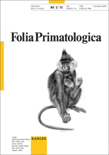
FOLIA PRIMATOLOGICA
Scope & Guideline
Fostering Understanding of Primates in a Global Context
Introduction
Aims and Scopes
- Primate Behavior and Ecology:
The journal focuses on the behavioral patterns of primates in both natural and controlled environments, examining aspects such as social structures, feeding habits, and activity budgets. - Conservation and Human-Primate Interactions:
Research on the impact of human activities on primate populations and their habitats is a core area, promoting strategies for conservation and sustainable coexistence. - Comparative Morphology and Evolution:
FOLIA PRIMATOLOGICA publishes studies that explore the evolutionary aspects and morphological variations among different primate species, contributing to the understanding of primate evolution. - Technological Applications in Primatology:
The journal includes innovative research utilizing technology, such as camera traps and touchscreen tasks, to study primate behavior and ecology in novel ways. - Community Engagement and Participatory Research:
A unique contribution of the journal is its emphasis on community involvement in conservation efforts, highlighting the importance of local perspectives in primate research.
Trending and Emerging
- Impact of Climate Change on Primate Habitats:
Recent publications increasingly address how climate change affects primate distribution and behavior, emphasizing the urgency of understanding these impacts for conservation efforts. - Technological Innovations in Study Methodologies:
There is a growing trend toward employing advanced technologies, such as remote sensing and digital tracking, to study primates, showcasing the integration of technology in primatology. - Social Networks and Communication:
Research on the social dynamics and communication patterns within primate groups is on the rise, reflecting a deeper exploration of social structures and relationships. - Conservation Strategies Involving Local Communities:
Emerging themes highlight the importance of participatory conservation methods, where local communities play a crucial role in protecting primate habitats and species. - Behavioral Plasticity in Response to Environmental Changes:
Studies focusing on how primates adapt their behavior in response to habitat alteration and human encroachment are becoming increasingly relevant, shedding light on resilience strategies.
Declining or Waning
- Traditional Taxonomy Studies:
There has been a noticeable decrease in publications solely focused on traditional taxonomic classifications of primates, as contemporary research increasingly emphasizes ecological and behavioral studies. - Captive Primate Studies:
Research centered on captive primate behavior has lessened, likely due to a growing interest in wild populations and the ecological context of primate behavior. - Morphological Studies without Ecological Context:
While morphological studies remain relevant, there is a decline in those that do not connect findings to behavioral or ecological implications, reflecting a shift towards integrative approaches. - Human-Monkey Conflict Studies:
Although still important, the frequency of studies specifically addressing human-monkey conflicts is waning, possibly due to a broader focus on comprehensive conservation strategies.
Similar Journals
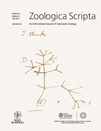
ZOOLOGICA SCRIPTA
Advancing knowledge in animal sciences and ecology.Zoologica Scripta, published by Wiley, stands as a distinguished journal within the fields of Animal Science and Zoology, Ecology, Evolution, Behavior and Systematics, Genetics, and Molecular Biology. With its inception dating back to 1971 and a convergence year extending to 2024, this journal consistently provides a platform for high-quality research, earning a Q1 ranking in two key categories and solid performance in additional fields, as evidenced by its significant Scopus rankings and impressive percentiles. Notably, it ranks 36 out of 490 journals in Animal Science and Zoology, placing it in the 92nd percentile. While Zoologica Scripta operates under a traditional access model, its rigorous peer-review process ensures that only the most impactful studies make their way into its pages. With a focus on advancing our understanding of biodiversity and evolutionary processes, this journal is indispensable for researchers, professionals, and students committed to the ongoing exploration of animal sciences and ecological studies.

American Journal of Biological Anthropology
Advancing Insights into Evolutionary BiologyThe American Journal of Biological Anthropology, published by WILEY, is a premier journal in the field of biological anthropology, boasting critical insights into human biological diversity, evolution, and adaptation. With its ISSN 2692-7691, this journal has established itself firmly within the research community, achieving a Q1 ranking in key disciplines such as Anatomy, Anthropology, Archeology, and Paleontology as of 2023. This indicates its significant impact, with Scopus rankings placing it in the top tiers across diverse fields, including a stellar rank of 13th out of 113 in Paleontology. Offering open access possibilities, the journal facilitates wider dissemination of groundbreaking research and is committed to advancing knowledge that intersects genetics, epidemiology, and anthropology. Based in the United States, the journal continually fosters an international dialogue among researchers, professionals, and students eager to explore the complexities of human biology through a robust and interdisciplinary lens.
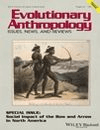
EVOLUTIONARY ANTHROPOLOGY
Innovating Insights into Our Evolutionary PastEVOLUTIONARY ANTHROPOLOGY is a premier journal published by WILEY, dedicated to advancing the field of anthropology through innovative and rigorous research. With an ISSN of 1060-1538 and an E-ISSN of 1520-6505, this journal boasts a remarkable Q1 ranking in both the Anthropology and Medicine (miscellaneous) categories, reflecting its significant impact within the academic community. Since its inception in 1992, it has continuously evolved, now encompassing a wide array of subjects pertinent to evolutionary studies and human health. Residing in the highly competitive Scopus rankings, it stands at an impressive rank of 10 out of 502 in the field, placing it within the top 2% of journals in Social Sciences - Anthropology. Researchers, professionals, and students alike will find this journal an invaluable resource for the latest findings, theoretical advancements, and discussions that shape our understanding of human evolution and its biological implications. While not categorized as an Open Access journal, EVOLUTIONARY ANTHROPOLOGY remains a vital outlet for high-quality scholarship, fostering dialogue and enriching knowledge across diverse audiences.
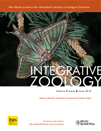
Integrative Zoology
Integrating Knowledge for Conservation SuccessIntegrative Zoology is a distinguished journal published by WILEY, focusing on advancing the field of zoological sciences through the integration of various biological disciplines. With both ISSN 1749-4877 and E-ISSN 1749-4869 identifiers, this journal features research that fosters a deeper understanding of animal biology, ecology, and conservation strategies. As a testament to its impact, Integrative Zoology is recognized within the Q1 category of Animal Science and Zoology in 2023, ranking an impressive #27 out of 490 journals in its field, placing it in the 94th percentile among peers. Published in the United Kingdom, this journal not only serves as a critical platform for novel research but also engages a global audience, inviting submissions that bridge theoretical and practical aspects of zoology. While not entirely open access, the journal remains committed to disseminating high-quality research that contributes substantially to scientific advancements. Through its continuous publication since 2008, Integrative Zoology aims to inspire researchers, educators, and students alike, making it a cornerstone for anyone passionate about the complexities of animal life.

BMC Zoology
Fostering collaboration in zoological research.BMC Zoology, published by BMC, is a distinguished open-access journal that has been advancing the field of zoological research since its inception in 2016. With an impressive Q2 ranking in both Animal Science and Zoology categories as of 2023, the journal occupies a significant position in the academic landscape, engaging a global readership dedicated to the exploration of animal biology. Based in the United Kingdom, BMC Zoology prides itself on providing a platform for innovative research, fostering collaboration among scientists, and facilitating access to high-quality scholarly articles. Researchers and practitioners in zoology can benefit from its extensive repository of articles that span various areas including conservation, ecology, and evolutionary biology. As an essential resource for scholars and students alike, BMC Zoology commits to enhancing the dissemination of knowledge in the zoological sciences through its open-access model, ensuring widespread access to cutting-edge research findings.

Ornithology Research
Bridging Gaps in Animal Science Through Avian InsightsOrnithology Research is a leading academic journal published by SPRINGERNATURE, specializing in the field of avian studies and contributing to the broader category of Animal Science and Zoology. With a respectable Q2 ranking in its field as of 2023, this journal provides a dynamic platform for the dissemination of innovative research findings related to ornithology, ecology, and conservation. The journal, which transitioned to an Open Access model, ensures that its research is accessible to a global audience, fostering collaboration and knowledge sharing across disciplines. With an E-ISSN of 2662-673X, Ornithology Research serves the needs of researchers, professionals, and students dedicated to understanding the complexities of avian life. Its commitment to high-impact, peer-reviewed articles makes it an essential resource for anyone interested in advancing the science of ornithology.
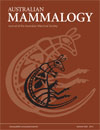
AUSTRALIAN MAMMALOGY
Exploring Australia's Unique Mammals and Their Ecological DynamicsAustralian Mammalogy, published by CSIRO PUBLISHING, is a pivotal journal in the fields of Animal Science and Zoology as well as Ecology, Evolution, Behavior and Systematics. With its ISSN 0310-0049 and E-ISSN 1836-7402, this esteemed journal has been instrumental in disseminating critical research findings since 2000, and continues to evolve up to 2024. Ranked in the Q2 quartile of both its categories for 2023, it showcases a diverse array of studies that contribute to understanding Australia’s unique mammalian fauna and its ecological dynamics. Researchers, professionals, and students will find valuable insights in its peer-reviewed articles, which are essential for advancing knowledge in these essential scientific disciplines. Located in Australia at UNIPARK, Locked Bag 10, Clayton, VIC, this journal remains committed to fostering scholarly communication within the global scientific community.

Zoological Letters
Connecting researchers to the pulse of zoological discovery.Zoological Letters, published by BMC, is a premier open-access journal dedicated to advancing the field of zoology and animal science. Since its inception in 2015, the journal has established itself as a critical platform for researchers to disseminate their findings and contribute to the ongoing discourse in this vibrant discipline. Based in the United Kingdom, Zoological Letters boasts an impressive Q2 category ranking in Animal Science and Zoology for 2023, placing it within the top 25% of journals in the field. With a Scopus rank of #116 out of 490, representing the 76th percentile, it showcases the influence and reach of the research published within its pages. The journal’s substantial focus on contemporary issues and methodologies ensures that it is a vital resource for academics, professionals, and students alike, fostering innovation and collaboration throughout the global scientific community. Open access since 2015, Zoological Letters is committed to making scientific knowledge accessible, thus enhancing the visibility and impact of research in zoological studies.

RUSSIAN JOURNAL OF THERIOLOGY
Connecting Researchers in Animal Science and EcologyRUSSIAN JOURNAL OF THERIOLOGY is a prominent academic journal published by KMK SCIENTIFIC PRESS LTD in collaboration with the esteemed Moscow State University. As a dedicated platform for researchers in the fields of Animal Science and Zoology, Ecology, Evolution, Behavior and Systematics, and Plant Science, this journal strives to advance our understanding of terrestrial ecosystems and their inhabitants. Although it currently holds a Q4 ranking and ranks within the lower percentiles of its respective categories, the journal's consistent publishing output since 2011 showcases a commitment to facilitating scientific discourse and collaboration. Addressed to a diverse audience of researchers, professionals, and students, RUSSIAN JOURNAL OF THERIOLOGY serves as an essential resource for disseminating valuable insights and fostering future advancements in the biological sciences.
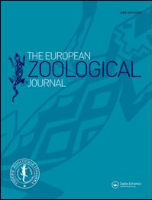
European Zoological Journal
Advancing the Frontiers of Animal ScienceEuropean Zoological Journal, published by Taylor & Francis Ltd, is an esteemed open-access publication dedicated to advancing the exciting field of zoology. Since its inception in 2017, this journal has progressively established itself as a vital resource for researchers, professionals, and students alike. With its Q2 ranking in Animal Science and Zoology as of 2023, the journal ranks in the 69th percentile among its peers, showcasing its influence and contribution to the discipline. The journal’s broad scope covers a wide range of topics within zoology, aiming to foster an understanding of animal biology and conservation efforts. As an open-access journal, it not only enhances the dissemination of knowledge but also encourages collaborative research across global communities. Situated in the United Kingdom, the European Zoological Journal invites submissions that contribute to the evolving discourse in animal sciences, and endeavors to support the scientific community in addressing pressing ecological challenges.